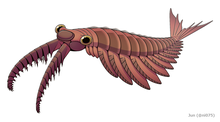Anomalocarididae
| Anomalocarididae | |
|---|---|

| |
| Anomalocaris canadensis | |

| |
| Lenisicaris lupata | |
| Scientific classification | |
| Domain: | Eukaryota |
| Kingdom: | Animalia |
| Phylum: | Arthropoda |
| Class: | †Dinocaridida |
| Order: | †Radiodonta |
| Family: | †Anomalocarididae Raymond, 1935 |
| Genera | |
| |
Anomalocarididae[1] (occasionally mis-spelt Anomalocaridae[2]) is an extinct family of Cambrian radiodonts, a group of stem-group arthropods.[3][4]
Around 1990s and early 2010s, Anomalocarididae included all radiodont species, hence the previous equivalent of the common name "anomalocaridid" to the whole Radiodonta.[5] This is no longer the case after the revision done by Vinther et al. 2014,[3] as Anomalocarididae restricted to only Anomalocaris and, if any, a few of closely related genera since then. Wu et al. 2021 accepted only Anomalocaris (excluding "A." saron, "A." kunmingensis and "A." briggsi) and Lenisicaris as the member of Anomalocarididae,[4] while Paranomalocaris is questionably included by some studies as well.[6][7][8] Since then, other species labeled under the Anomalocaris genus, like ''A.'' saron have been reassigned to their own genus (like in the case of ''A.'' saron being redescribed as Innovatiocaris).[9]
Anomalocarididae distinguished from the similar family Amplectobeluidae (e.g. Amplectobelua, Lyrarapax) by the presence of triradial oral cone[10] and non-hypertrophied first distal endite.[4] Compared to Hurdiidae and Tamisiocarididae, this two radiodont families shared a lot of characters (i.e. alternated endite length;[11] streamlined body;[12] small head with ovoid sclerites;[13][14] well-developed swimming flaps;[12][13][15] caudal furcae;[12] raptorial predatory lifestyle[16][14][11]) and forming a clade in multiple phylogenetic analysis.[3][6][16][7][11]
See also[edit]
References[edit]
- ^ RAYMOND, P. E. 1935. Leanchoilia and other mid-Cambrian Arthropoda. Bulletin of the Museum of Comparative Zoology, Harvard University, 76: 205–230.
- ^ Wang, YuanYuan; Huang, DiYing; Hu, ShiXue (2013-11-01). "New anomalocardid frontal appendages from the Guanshan biota, eastern Yunnan". Chinese Science Bulletin. 58 (32): 3937–3942. doi:10.1007/s11434-013-5908-x. ISSN 1861-9541.
- ^ a b c Vinther, Jakob; Stein, Martin; Longrich, Nicholas R.; Harper, David A. T. (2014). "A suspension-feeding anomalocarid from the Early Cambrian". Nature. 507 (7493): 496–499. doi:10.1038/nature13010. hdl:1983/88f89453-e81f-4767-a74d-1794c33e6b34. ISSN 1476-4687. PMID 24670770. S2CID 205237459.
- ^ a b c Wu, Yu; Ma, Jiaxin; Lin, Weiliang; Sun, Ao; Zhang, Xingliang; Fu, Dongjing (2021-05-01). "New anomalocaridids (Panarthropoda: Radiodonta) from the lower Cambrian Chengjiang Lagerstätte: Biostratigraphic and paleobiogeographic implications". Palaeogeography, Palaeoclimatology, Palaeoecology. 569: 110333. doi:10.1016/j.palaeo.2021.110333. ISSN 0031-0182. S2CID 233565727.
- ^ Edgecombe, Gregory D. (2010-03-01). "Arthropod phylogeny: An overview from the perspectives of morphology, molecular data and the fossil record". Arthropod Structure & Development. Fossil Record and Phylogeny of the Arthropoda. 39 (2): 74–87. doi:10.1016/j.asd.2009.10.002. ISSN 1467-8039. PMID 19854297.
- ^ a b Van Roy, Peter; Daley, Allison C.; Briggs, Derek E. G. (2015). "Anomalocaridid trunk limb homology revealed by a giant filter-feeder with paired flaps". Nature. 522 (7554): 77–80. doi:10.1038/nature14256. ISSN 1476-4687. PMID 25762145. S2CID 205242881.
- ^ a b Liu, Jianni; Lerosey-Aubril, Rudy; Steiner, Michael; Dunlop, Jason A; Shu, Degan; Paterson, John R (2018-11-01). "Origin of raptorial feeding in juvenile euarthropods revealed by a Cambrian radiodontan". National Science Review. 5 (6): 863–869. doi:10.1093/nsr/nwy057. ISSN 2095-5138.
- ^ Jiao, De-guang; Pates, Stephen; Lerosey-Aubril, Rudy; Ortega-Hernandez, Javier; Yang, Jie; Lan, Tian; Zhang, Xi-guang (2021). "The endemic radiodonts of the Cambrian Stage 4 Guanshan biota of South China". Acta Palaeontologica Polonica. 66. doi:10.4202/app.00870.2020. ISSN 0567-7920.
- ^ Zeng, Han; Zhao, Fangchen; Zhu, Maoyan (2022-09-07). "Innovatiocaris, a complete radiodont from the early Cambrian Chengjiang Lagerstätte and its implications for the phylogeny of Radiodonta". Journal of the Geological Society. 180. doi:10.1144/jgs2021-164. ISSN 0016-7649. S2CID 252147346.
- ^ Daley, Allison C.; Bergström, Jan (2012-06-01). "The oral cone of Anomalocaris is not a classic peytoia". Naturwissenschaften. 99 (6): 501–504. doi:10.1007/s00114-012-0910-8. ISSN 1432-1904. PMID 22476406. S2CID 2042726.
- ^ a b c Moysiuk, Joseph; Caron, Jean-Bernard (2021). "Exceptional multifunctionality in the feeding apparatus of a mid-Cambrian radiodont". Paleobiology. 47 (4): 704–724. doi:10.1017/pab.2021.19. ISSN 0094-8373. S2CID 236552819.
- ^ a b c Chen, Jun-yuan; Ramsköld, Lars; Zhou, Gui-qing (1994-05-27). "Evidence for Monophyly and Arthropod Affinity of Cambrian Giant Predators". Science. 264 (5163): 1304–1308. doi:10.1126/science.264.5163.1304. PMID 17780848. S2CID 1913482.
- ^ a b Daley, Allison C.; Edgecombe, Gregory D. (2014). "Morphology of Anomalocaris canadensis from the Burgess Shale". Journal of Paleontology. 88 (1): 68–91. doi:10.1666/13-067. ISSN 0022-3360. S2CID 86683798.
- ^ a b Moysiuk, J.; Caron, J.-B. (2019-08-14). "A new hurdiid radiodont from the Burgess Shale evinces the exploitation of Cambrian infaunal food sources". Proceedings of the Royal Society B: Biological Sciences. 286 (1908): 20191079. doi:10.1098/rspb.2019.1079. PMC 6710600. PMID 31362637.
- ^ Cong, Peiyun; Daley, Allison C.; Edgecombe, Gregory D.; Hou, Xianguang (2017-08-30). "The functional head of the Cambrian radiodontan (stem-group Euarthropoda) Amplectobelua symbrachiata". BMC Evolutionary Biology. 17 (1): 208. doi:10.1186/s12862-017-1049-1. ISSN 1471-2148. PMC 5577670. PMID 28854872.
- ^ a b Lerosey-Aubril, Rudy; Pates, Stephen (2018-09-14). "New suspension-feeding radiodont suggests evolution of microplanktivory in Cambrian macronekton". Nature Communications. 9 (1): 3774. doi:10.1038/s41467-018-06229-7. ISSN 2041-1723. PMC 6138677. PMID 30218075.

